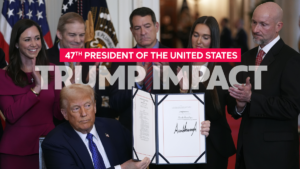Trump admin. threatens to withhold $460M in food-stamp funding if Pa. doesn’t share personal data
A long-simmering battle between Pennsylvania Gov. Josh Shapiro and the White House over the state’s food-stamp program is set to come to a head by the end of this week.

Pennsylvania Gov. Josh Shapiro (left) and President Donald Trump. (Matt Slocum / Kirsty Wigglesworth / Associated Press)
This story originally appeared on WESA.
A long-simmering battle between Pennsylvania Gov. Josh Shapiro and the White House over the state’s food-stamp program is set to come to a head by the end of this week.
The U.S. Department of Agriculture has given the state until Friday to provide personal data — including names, addresses, and Social Security numbers — about those who receive food assistance. And if it doesn’t get the data, it has threatened to withhold more than 10 cents of every dollar in food aid the state currently receives — nearly half a billion dollars each year.
In an Aug. 20 letter obtained by WESA, USDA said it had given Shapiro a “formal warning” to either transmit enrollment data or provide an acceptable alternative by Sept. 19. Otherwise, the federal agency would “disallow up to $115,304,035.91… for each quarter in which [the] Department of Human Services is out of compliance.”
The dispute concerns SNAP, the federally-funded Supplemental Nutrition Assistance Program, which provides food aid to struggling households. Nearly 2 million Pennsylvanians are enrolled in the program: Its benefits, which are often referred to as “food stamps,” amounted to more than $350 million per month as of August.
The Shapiro administration is saying little about the dispute. The governor’s office deferred comment to DHS, where a spokesperson said the department “has been in touch with the USDA regarding its request for states to provide SNAP data by this Friday,” according to a statement from a spokesperson Wednesday. “We continue to evaluate next steps.”
But advocacy groups say they have concerns about the data request — and the threat of lost funding.
Ann Sanders, who leads the Pittsburgh-based anti-hunger group Just Harvest, said there are already mechanisms in place to ensure benefits only reach those eligible to receive them. ”USDA is already evaluating program integrity, so … the data request seems very spurious,” she said.
Pennsylvania currently shares SNAP data with the feds through an interstate data-matching system used to prevent people from receiving benefits in more than one state. (The state also has an agency dedicated to public-benefit fraud.)
“ Redundant data is just usually a data security no-no,” Sanders said, adding the government should “try not to store people’s personally identifying information in bunch of different places, [because] that just creates more opportunities for security leaks.”
President Donald Trump has ushered in a number of changes to the food-stamp program, including new work requirements for adults that went into effect Sept. 1. The USDA, which manages the SNAP program, has also said it wants more information about beneficiaries to stop “waste, fraud and abuse.”
The agency first sought identifying information about recipients in May, but so far the state’s Department of Human Services has so far resisted the demands. In response to the federal request, DHS said that out of 1.9 million people receiving SNAP benefits, it had disqualified only 55 applicants for fraud or parole violations between January and May.
And in a July letter, DHS staff said Pennsylvania wasn’t able to hand over the information due to “sensitivity” of the data, “the relatively short timeframe outlined in the request,” and the fact that “several states have raised concerns regarding the legal authority and procedural processes associated with this request.”
Several states filed a lawsuit over the data request in July: California’s attorney general argued that the request would allow for creation of a “government surveillance database.” Shapiro did not join that suit, although his administration has already sued the Trump administration at least a dozen times this year, including once over an axed USDA food-purchasing program.
The threatened $115.3 million penalty is based on the state’s 10.76% SNAP error rate, a number that changes from year-to-year by calculating overpayments and underpayments of food assistance dollars. The error rate is not a measure of fraud, since administrative and paperwork errors can also result in misdirected benefits. But the USDA is essentially using the rate to dock the state for every dollar that could potentially be misspent.
The Trump administration will start to penalize states in 2027 if their food assistance error rates remain above 10%. Pennsylvania could lose more than a half billion federal dollars for the program if it exceeds that threshold in less than two years.
Sanders said that food-justice advocates worry the data request is really part of the Trump administration’s sweeping immigration-control effort, and that information in the request could be shared with ICE and the U.S. Department of Homeland Security.
“That’s not what SNAP data is supposed to be used for — it’s only supposed to be used for program evaluation and quality control,” Sanders said. While undocumented people are not eligible for food assistance benefits, she said, their household could include a child or someone else who is.
”Say there’s a parent who doesn’t have status currently or is even here on a work visa — they’re also not eligible, but they receive benefits for their child who is a U.S. citizen — their information would also be in that case,” she said.
The Trump administration has already shared data for millions of Medicaid recipients with Homeland Security officials. Twenty states sued the administration over that move in July.
USDA deferred comment to the Department of Justice, which did not immediately respond to a request asking which states have complied since receiving formal warnings last month.
Reactions to the USDA request have varied from state to state. Republican governors in many states, including Vermont and Virginia, complied over the summer as their Democratic counterparts have taken the matter to court. The controversy has boiled over into a public legal battle in Kansas, where Republican attorney general Kris Kobach has sued Gov. Laura Kelly, a Democrat.
Kate Giammarise contributed reporting.
Get daily updates from WHYY News!
WHYY is your source for fact-based, in-depth journalism and information. As a nonprofit organization, we rely on financial support from readers like you. Please give today.




